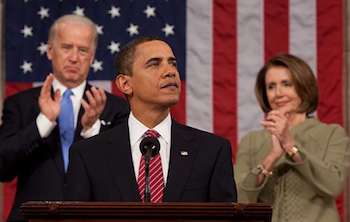- MENU
- HOME
- SEARCH
- WORLD
- MAIN
- AFRICA
- ASIA
- BALKANS
- EUROPE
- LATIN AMERICA
- MIDDLE EAST
- United Kingdom
- United States
- Argentina
- Australia
- Austria
- Benelux
- Brazil
- Canada
- China
- France
- Germany
- Greece
- Hungary
- India
- Indonesia
- Ireland
- Israel
- Italy
- Japan
- Korea
- Mexico
- New Zealand
- Pakistan
- Philippines
- Poland
- Russia
- South Africa
- Spain
- Taiwan
- Turkey
- USA
- BUSINESS
- WEALTH
- STOCKS
- TECH
- HEALTH
- LIFESTYLE
- ENTERTAINMENT
- SPORTS
- RSS
- iHaveNet.com: Politics
by Rob Silverblatt

President Obama
President Barack Obama assumed a decidedly populist tone last night as he called for a multilayered safety net for the country's ailing small businesses. In a speech peppered with references to individual letters from Americans and examples from various cities across the country, Obama promised infusions of cash and tax credits for small-business owners. And as he bashed Wall Street for its role in the recession, he looked to frame the remaining stages of the government's recovery plan as an attempt to salvage average companies rather than large banks.
"Through sheer grit and determination, these companies have weathered the recession and are ready to grow," Obama said in his State of the Union address. "But when you talk to small-business owners in places like Allentown, Pa., or Elyria, Ohio, you find out that even though banks on Wall Street are lending again, they are mostly lending to bigger companies."
To that end, Obama proposed spending
"It's certainly a good start, and it's something that we're very supportive of," Molly Brogan, a spokesperson for the
In the NSBA's year-end study for 2009, 78 percent of the small-business owners who responded said that they had been hurt by the credit crisis. More than one third of respondents said that they couldn't get adequate financing.
Overall, though, the response to the lending proposal was lukewarm. "Community banks don't need any money to loan to small businesses. They've got plenty of money; they're flush with cash," says Jim Blasingame, a small-business expert and the host of The Small Business Advocate Show, a nationally syndicated radio show. The real problem, Blasingame says, is that not enough businesses are in a position to take out loans. "Small businesses aren't borrowing money," he says. "Small businesses aren't coming to the banks to ask for loans."
According to Blasingame, what small businesses need is job creation in the broader economy so that consumers will have more money to spend on the products the businesses produce.
Another potential issue is that it remains unclear what types of strings the Obama administration will attach to the
Raymond Keating, the chief economist for the
Obama got broader support from small-business advocates for his plans to encourage exports and to take part in free-trade agreements. "[The] more products we make and sell to other countries, the more jobs we support right here in America," the president said. "So tonight, we set a new goal: We will double our exports over the next five years, an increase that will support 2 million jobs in America."
Elsewhere in his speech, he said, "If America sits on the sidelines while other nations sign trade deals, we will lose the chance to create jobs on our shores."
While many of Obama's remarks were expected, his enthusiasm for trade proposals caught a number of experts off guard--and left them pleasantly surprised. Keating says that he didn't expect the president to delve into the debate. "It would be a good thing [if we can get] off the sidelines," he says. "The fact that he indicated that is probably the biggest positive out of the speech."
Brogan says that beefed-up export policies can help small businesses find new markets. "It's a great idea, particularly when we're faced with a jobless economic recovery," she says. "Exporting is a really great opportunity for small businesses right now."
Obama also talked about tax incentives. He proposed a tax credit for small businesses that hire new workers or raise wages and supported a plan to eliminate capital-gains taxes on small-business investment. Overall, small-business advocates appear to be ambivalent about the capital-gains proposal. The hiring tax, on the other hand, has elicited a more complicated response.
"The idea to make hiring easier for small businesses is a good one," the NSBA said in a statement last night. "Unfortunately, when polling our members, few believe that a hiring tax credit--which would likely be temporary--would be incentive enough to take on new employees, particularly given costly benefits. In many cases, people who take advantage of this tax credit would have hired the new employee regardless."
Obama's remarks came at a challenging time for small-business owners. Notably, 64 percent of the owners who responded to the NSBA's year-end survey said that economic uncertainty was their most significant challenge. Meanwhile, 44 percent indicated that they had downsized in 2009.
Small-business owners remain fearful that healthcare reform could harm them. They also are leery of proposals for a cap-and-trade bill to reduce greenhouse gas emission. "If [Obama] can't make small-business owners believe that he's not going to pass policies that are going to hurt them, all the tax credits, all the bank loans that he can offer small-business owners are not going to get them to go hire more people," says Blasingame.
Available at Amazon.com:
The Political Fix: Changing the Game of American Democracy, from the Grassroots to the White House
AMERICAN POLITICS
WORLD | AFRICA | ASIA | EUROPE | LATIN AMERICA | MIDDLE EAST | UNITED STATES | ECONOMICS | EDUCATION | ENVIRONMENT | FOREIGN POLICY | POLITICS
Receive our political analysis by email by subscribing here
Obama Courts Small-Business Owners | Rob Silverblatt
© Tribune Media Services